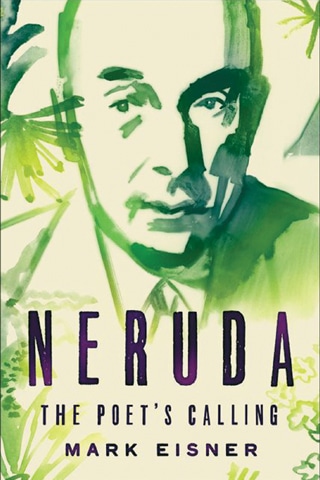
FEW poets offer their biographers as rich a vein of material as the Chilean Nobel Prize-winner Pablo Neruda. Born in Parral, Chile, in 1904, Neruda transcended his modest origins and provincial upbringing to achieve success and significance far beyond the dreams of most writers.
Books like Twenty Love Poems and a Song of Despair, Residence on Earth and Elemental Odes have sold tens of millions of copies. Nearly 45 years after his death, Neruda continues to be regarded as one of the most significant poets of the 20th century. In his home country, he remains a beloved and potent national symbol.
Mark Eisner’s new biography, Neruda: The Poet’s Calling, explores the complex confluence of factors that accounts for Neruda’s extraordinary fame and success. Far more than most modern poetry, Neruda’s body of work is quite accessible — a fact that reflects not only his personal preferences but also his political views. Moved at an early age by the exploitation of the disadvantaged, he viewed poetry as existing for the benefit of the common people.
“Poetry is like bread,” he famously wrote. “It should be shared by all, by scholars and by peasants, by all our vast, incredible, extraordinary family of humanity.” When it was not overtly political, his poetry tended to concern itself with matters of quotidian existence, finding love and beauty in the commonplace, ordinary objects of daily human life.
Politics was never far from Neruda’s mind, and the story of his life is largely concomitant with the political history of the 20th century. The Chilean capital of Santiago, when he arrived there in 1921, was the centre of an active student movement that hungered for progressive poetry. In the 1930s, he watched Spain fall into civil war from his post as a diplomat in Barcelona. Neruda already leaned toward socialism as a result of his Chilean experiences; now, watching as the Soviet Union stepped in to support the Spanish Republicans against Franco’s fascists while the rest of the world remained largely indifferent, he became a loyal communist and supporter of Stalin.
The origins of Neruda’s esteem for Stalin, then, are largely understandable. But his loyalty would persist for decades, long after reports of the brutal reality of Stalin’s dictatorial regime began to emerge, and though he did eventually repudiate that loyalty, it is not entirely clear why it took him so long. (Of course, Neruda was far from the only leftist intellectual of whom this could be said.)
Closer to home, his political activities were easier to admire. In Chile, he always managed to be on the side that opposed the dictators. When, in the late 1940s, the country’s Communist Party was outlawed and protests by coal miners were brutally suppressed, Neruda criticised the government in the international press and on the floor of the Chilean Senate. When the government tried to arrest him, he made a dramatic escape on horseback across the border into Argentina.
He returned to Chile in the mid-1950s and would spend most of the rest of his life there. His death from cancer, on Sept 23, 1973, occurred a mere 12 days after the US-backed coup in which Augusto Pinochet’s forces seized control from the democratically elected President Salvador Allende. Neruda’s funeral became a spontaneous public demonstration of defiance against the new regime. While soldiers looked on, armed with machine guns but holding their fire, the crowd chanted, “He isn’t dead, he isn’t dead! He has only fallen asleep!”
The messiness of Neruda’s personal life, which was as eventful as his public one and which serves as evidence of his passionate, somewhat impulsive nature, does not always display him in a wholly admirable light. He neglected and then abandoned his first wife, barely acknowledging the existence of their daughter, who was born severely disabled. He seemed very much in love with his second wife; still, while they were together, he began an affair with the woman who would become his third.
Towards the end of his life, he would cheat on her as well, with her niece.
It is, undeniably, a great story. But it is a story that has been told before — most satisfyingly, perhaps, in Adam Feinstein’s 2004 biography, Pablo Neruda: A Passion for Life. The need for a new biography is not entirely obvious; and unfortunately, the man who lies at the heart of all these turbulent personal and political maelstroms remains oddly and frustratingly distant in Eisner’s telling.
Despite his ongoing work on a documentary about Neruda and his work as a translator of The Essential Neruda: Selected Poems (2004), in this biography Eisner tends to keep his subject at arm’s length. Outside of the excerpts from Neruda’s own poetry, one gets little sense of the man’s inner life.
Eisner’s prose, moreover, is on the whole, fairly pedestrian, except for a few unfortunate occasions when it strives, unwisely, for a kind of Nerudaesque poeticism. Describing his first sexual experience, for instance, Eisner writes Neruda “attempted to plow through her and reach the depths of the earth”. And his criticisms of Neruda tend to be articulated using what are by now rote, clichéd terms that make them feel like empty, obligatory gestures. Thus, Neruda is labelled as an “aggressor — even predator” in his sexual relations; an apparent sexual assault is identified as an “exercise of power and privilege”; and his general sexual behaviour is at one point characterised as “imperialism perpetrated on a human scale”.
Ultimately, Neruda: The Poet’s Calling is not as satisfying as one might have hoped. Still, Neruda’s life remains a source of fascination, and his work remains vital. Any book that is likely to help bring new generations of readers to it is to be valued for that reason alone.
—By arrangement with The Washington Post
Published in Dawn, April 19th, 2018











































